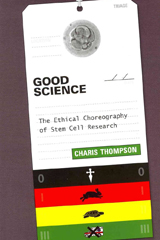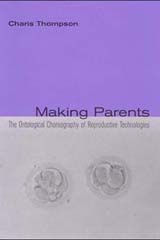Professor Charis Thompson joined the Department of Sociology from the University of California, Berkeley where she was Professor of Gender and Women’s Studies and a former Director of the Science, Technology, and Society Center. Before moving to Berkeley, she was in the History of Science Department at Harvard University. She is the author of Making Parents: The Ontological Choreography of Reproductive Technologies, which won the 2007 Rachel Carson Award from the Society for the Social Study of Science, and of Good Science: The Ethical Choreography of Stem Cell Research (MIT Press 2013). She is currently writing a book, Getting Ahead, on living in the time of Science and Technology elites. She is a recipient of UC Berkeley's Social Science Distinguished Teaching Award. She has served on the Nuffield Council Human Genome Editing Working Group and on the World Economic Forum Global Technology Council on Technology, Values and Policy.
Charis received her PhD from the Sociology (Science Studies) program at UC San Diego, and her BA in Philosophy, Psychology, and Physiology at Oxford University. She also holds an Honorary Doctorate (2017) for services to Science and Society, from the Norwegian University of Science and Technology.
For the 2020-2021 Academic year Charis is Visiting Professor for the School of Social Science, Princeton Institute for Advanced Study.
Publications
Books
2013 Good Science: The Ethical Choreography of Stem Cell Research. MIT Press.
2005 Making Parents: The Ontological Choreography of Reproductive Technologies. MIT Press, Inside Technology Series.
In preparation: Getting Ahead: Science, Technology, and the State in an Age of AI, Genome Editing, and Inequality
Books
 |
 |
Journals
2020. How Should “CRISPRed” Babies Be Monitored Over Their Life Course to Promote Health Equity? AMA Journal of Ethics.
2019. What's Law got to do with Good Science? A forum of responses to Good Science (Charis Thompson, 2013). Ilke Turkmendag, Marie Fox, Charis Thompson, Thérèse Murphy. Social and Legal Studies.
2018. Introduction to Symposium: Making and breaking families – reading queer reproductions, stratified reproduction and reproductive justice together. With Marcin Smietana and France Winddance Twine. Reproductive Biomedicine and Society Online.
2016: "IVF global histories, USA: between rock and a marketplace." Reproductive Biomedicine & Society Online, 2. pp. 128-135.
2014: "Designing for the life sciences: the epistemology of elite life science real estate," Tecnoscienza: Italian Journal of Science & Technology Studies, 5 (2). pp. 43-58.
2014: “Vote, ovocytes et cosmétiques. Les Trois Jalons identitaires du recours au genre dans la recherche sure les cellules souches en Californie,” (Three Times a Woman: Voting, Egg Donation, Cosmetics, and the Punctuated Gendering of Biomedical Innovation) Cahiers du Genre 56:105-138.
2013: “Conceptual Clarity for Conception Frameworks: Commentary on Sarah Franklin’s “In Vitro Anthropos,” Cambridge Anthropology
2011: “Medical Migrations Afterword: Science as a Vacation?” Body and Society 17(2-3): 205-213.
2009: "Medical Tourism, Stem Cells, Genomics: EASTS, Transnational STS, and the Contemporary Life Sciences," East Asian Science, Technology and Society: an International Journal 2(3): 433-438.
2007: “Can opposition to research spur innovation?” Nature Reports: Stem Cells 13 December.
2007: “Why we should, in fact, pay for egg donation,” Regenerative Medicine 2(2), 203-209.
2007: “God is in the Details: Comparative Perspectives on the Intertwining of Religion and Assisted Reproductive Technologies,” Culture, Medicine, and Psychiatry 30(4):557-561.
2006: “Back to Nature? Resurrecting Ecofeminism after Poststructuralist and Third-Wave Feminisms,” Isis 97(3): 505-512.
2006: “Race Science,” Theory, Culture & Society (Special Issue on Problematizing Global Knowledge) 23(2-3): 547-549. () 23(2-3): 547-549.
2003: “Comment, Forum on Gender and Nation in Post-War Visual Culture,” Gender and History 15:262-267.
2002: “Ranchers, Scientists, and Grass-Roots Development in the United States and Kenya” Environmental Values 11: 303-326.
1997: "Des Eléphants dans le Magasin de la Science: Comment concilier biodiversité, intérets humains et connaissance scientifique?" La Recherche 303: 53-56.
1996: "Ontological Choreography: Agency through Objectification in Infertility Clinics," Social Studies of Science 26:575-610.
1995: "Les Cycles de la Conception: les techniques de normalisation dans un centre de traitement de la stérilité," Techniques & culture 25-26:307-338.
Book reviews
2014: “Reproductions Through Technology,” Science, 25 April 2014: 361-362.
Refereed book chapters
2013: “Sujetos humanos colombianos y consentimiento en biomedicina en idioma ingles,” in Olga Restrepo Forero (ed.) Proyecto Ensamblado en Colombia. v. 2. Ensamblando heteroglosias. Bogotá: Colciencias, 143-158
2012: “Biomaterialien und Bioinformationen nehmen, Berkeley USA 2010. Ein Fallbeispiel,” in ed. Susanne Lettow, Bioökonomie: die Lebenswissenschaften und die Bewirtschaftung der Körper. Bielefeld, 30-60.
2010: “Informed Consent for the Age of Pluripotency and Embryo Triage: from Alienation, Anonymity and Altruism to Connection, Contact, and Care,” in eds. Jeff Nisker, Françoise Baylis, Isabel Karpin, Carolyn McLeod, and Roxanne Mykitiuk, The ‘Healthy’ Embryo: Social, Biomedical, Legal and Philosophical Perspectives. Cambridge University Press, 45-59.
2009: “Skin Tone and the Persistence of Biological Race in Egg Donation for Assisted Reproduction,” in ed. Evelyn Nakano Glenn, Shades of Difference. Stanford University Press, 131-147.
2008: “Stem Cells, Women, and the New Gender and Science,” in ed. Londa Schiebinger, Gendered Innovations in Science and Engineering. Stanford University Press, 109-130.
2004: “Co-Producing CITES and the African Elephant,” in ed. Sheila Jasanoff, States of Knowledge: The Co-Production of Science and Social Order. Routledge, 67-86.
2002: “Fertile Ground: Feminists Theorize Infertility,” in eds. Marcia Inhorn, and Frank van Balen, Infertility Around the Globe: New Thinking on Childlessness, Gender, and New Reproductive Technologies. University of California Press, 52-78.
2002. “When Elephants Stand for Competing Models of Nature,” in eds. Annemarie Mol and John Law Complexities: Social Studies of Knowledge Practices. Duke University Press, 166-190.
2001: “Strategic Naturalizing: Kinship in an Infertility Clinic,” in eds. Sarah Franklin and Susan McKinnon, Relative Values: Reconfiguring Kinship Studies. Duke University Press, 175-202.
1999: "Confessions of a Bioterrorist: subject position and the valuing of reproductions," in eds. E. Ann Kaplan and Susan Squier, Playing Dolly: Technocultural Formations, Fantasies, and Fictions of Assisted Reproduction. Rutgers University Press, pp. 189-219.
1999: "Primate Suspect: Some Varieties of Science Studies," in eds. Shirley Strum and Linda Fedigan, Close Encounters: Primates, Science and Scientists. Chicago University Press, 329-357.
1998: "Producing Reproduction: Techniques of Normalization and Naturalization in an Infertility Clinic", in eds. Sarah Franklin and Helena Ragoné, Reproducing Reproduction: Kinship, Power, and Technological Innovation. University of Pennsylvania Press, 66-101.
1998: "Quit Sniveling Cryo-Baby, We'll Work Out Which One's Your Mama: Kinship in an Infertility Clinic," in eds. Robbie Davis-Floyd and Joe Dumit, Cyborg Babies: From Techno-Sex to Techno-Tots. Routledge, 40-66
1998: “Ontological Choreography: Agency for Women Patients in an Infertility Clinic,” in eds. Marc Berg and Annemarie Mol, Differences in Medicine: Unraveling Practices, Techniques and Bodies. Duke University Press, 166-201
Textbook chapter and encyclopaedia entries
2006: “Stem Cell Research,” in Issues: Understanding Controversy and Society, ABC-CLIO http://www.abc-clio.com/
2002: “Situated Knowledges: Feminist and Science and Technology Studies Perspectives,” in eds. N. Smelser and P. Bates, International Encyclopedia of the Social and Behavioral Sciences. Elsevier Science, 14129-14133.
Art book text
Cussins, Adrian, 1994: "Taking a Deposition from the River: What’s Literal about Adam Lowe’s Littoral Deposits?” London: London Print Centre.